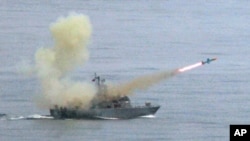The U.S. withdrawal from Afghanistan fails any comparison to Washington’s role in Taiwan because no American troops are stationed on the island and Taiwan’s most likely enemy, China, lacks any physical stronghold there, analysts told VOA this week after Chinese media linked the two situations.
Conversely, they add, the United States is better placed to help Taiwan now with part of its military budget no longer tied up in Afghanistan, and China is probably using its media to discredit Washington.
With the rapid Taliban takeover of Afghanistan and the American troop withdrawal, China’s government-backed, English-language Global Times newspaper suggested on August 16 that Taiwan could suffer the same sudden pullout of U.S. forces as has Afghanistan.
“Now the rapidly changing situation in Afghanistan has even worried some in the island of Taiwan and sounded a warning bell to secessionists there, as it's not the first time the U.S. has abandoned its allies and the so-called alliances, which are made use of only as chess pieces in Washington's global strategy,” the Global Times editorial said.
The Afghanistan-Taiwan comparison doesn’t work, however, political science scholars say.
“There is no U.S. pullout that could be envisioned there, and so there’s no prospect that Taiwan is going to collapse anytime soon,” said Scott Harold, a Washington-based senior political scientist with the Rand Corp. research organization.
“Taiwan is not connected to China by a land border, and there is not an active insurgency going on inside Taiwan,” he said.
In Afghanistan, the Taliban already controlled parts of the country before the United States withdrew. U.S. troops reached Afghanistan in late 2001 to look for al-Qaida operatives after that year’s September 11 terrorist attacks.
In another contrast with Afghanistan, Taiwan’s democratic government is stable and its own military well established, Harold said.
Withdrawal of troops from Afghanistan stops a “drain” of U.S. taxpayer money, he added. The United States had spent $2.26 trillion on the war in Afghanistan as of April, including operations in Pakistan, the Watson Institute of International & Public Affairs at Brown University estimated.
The intents of U.S. engagement in Afghanistan and Taiwan differ markedly too, said Michael Shoebridge, director of the Australian Strategic Policy Institute’s Defense, Strategy and National Security program.
“In one way the U.S. and its coalition partners, which include Australia and NATO members, were doing things to Afghanistan, whereas in the Indo-Pacific and in cases like Taiwan, the Americans are working with their security partners and allies for joint interests and ends,” he said.
U.S. officials are bound by the 1979 Taiwan Relations Act to consider defending Taiwan if needed.
Taiwan President Tsai Ing-wen, backed by a political party with an especially guarded view toward China, and former U.S. President Donald Trump deepened relations with a flurry of senior-level visits, U.S. Navy ship passages in the Taiwan Strait and additional arms sales.
U.S. State Department spokesman Ned Price told reinforced the U.S. commitment to Taiwan at the department’s press briefing August 19.
“We do have an abiding interest in peace and security across the Taiwan Strait,” he said.
“We consider this central to the security and stability of the broader region, of the broader Indo-Pacific. Events elsewhere in the world, whether that’s in Afghanistan or any other region, are not going to change that.” he told reporters.
China claims sovereignty over Taiwan, though the two sides have been separately ruled since Chiang Kai-shek’s Nationalists lost the Chinese civil war to Mao Zedong’s Communists and retreated to the island.
Taiwan regards China as a military foe, as Beijing has not renounced use of force to bring Taiwan under its flag. Beijing usually protests any U.S. military aid to Taiwan as well as major strides in political relations.
China, as a longstanding government, should hesitate in casting itself as a Taliban-like aggressor, analysts caution. The Taliban was a rebel insurgency until this month.
“The Chinese Communist Party and Taliban both use military might to obtain their political power, but in terms of political systems the two can’t be so simply compared,” said Huang Kwei-bo, vice dean of the international affairs college at National Chengchi University in Taipei.
“If you want to make that kind of comparison, couldn’t someone say the modern Vietnamese Communist Party is the Taliban?” Huang said. “So, we need to be extremely careful.”
Chinese media, most of which are government-run, probably meant for their Taiwan-Afghanistan comments to discredit the United States as an ally, said Yun Sun, co-director of the East Asia program at the Stimson Center in Washington.
“They are trying to use the case of Afghanistan to sow the seed of doubt among the Taiwanese and also to demonstrate to the international community that U.S. commitment is unreliable,” Sun said.
The United States “abandoned” allies in South Vietnam and eventually evacuated most U.S. citizens in Saigon, the Global Times report says. Two years ago, it adds, U.S. troops withdrew from northern Syria “abruptly and abandoned their allies.” Taiwan, the commentary adds, “is the region that relies on the protection of the U.S. the most in Asia”.
Taiwan’s ruling Democratic Party spokesperson Hsieh Pei-fen said in an August 19 social media statement that the issues in Taiwan and Afghanistan are “different by nature.”
VOA's Elizabeth Lee contributed to this report.




